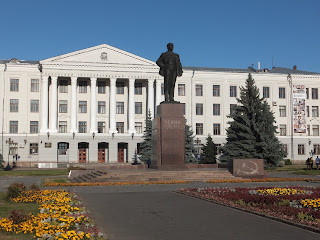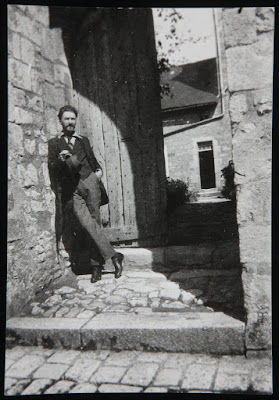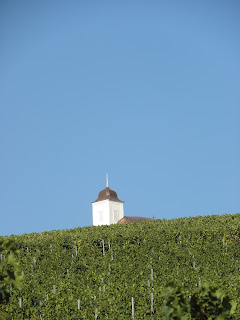Pskov - a travel essay
The charm of the setting was not shattered by the sound of
distant explosions. Nobody looked up from their beer and their conversation.
They all know that this is a military town, home of the 76th Pskov Airborne
Division. A loose flock of hooded crows flew overhead, a thousand black
silhouettes against the pearly evening sky, southward over the Kremlin, over
the golden cathedral domes.
"A murder of crows..." But Dmitri, who had joined
us for a beer, didn't believe me that the correct collective noun in English
for crows was a "murder". But perhaps it was the "murder"
of crows, the association in the words, that prompted him to tell me the story
of a double funeral.
Last year - in August 2014 - two men of the 76th Pskov
Airborne Division were, Dmitri told us, buried in a local cemetery with full
honours. When news of the funerals filtered out, journalists from Moscow and St Petersburg descended
on Pskov Ukraine
The official story goes that there are no Russian troops
fighting in the Donbas, the Russian-speaking eastern part of the Ukraine , the part that is occupied by rebels
against the government in Kiev Russia is a free country
and if anybody, military or otherwise, wishes to spend their holidays in the Ukraine
In August 2014, the website "kremlin.ru" published
a Presidential Decree to the effect that
the
76th Guards Air Assault Chernigov Red Banner Division of Russian Airborne Troops
have been awarded the Suvorov Award for successful fulfilment of combat
assignments of the command and display of the personal staff of courage and
heroism.
*
Monument on Falcon Hill to Alexander Nevsky
The statue was meant to have been unveiled in April 1992, to
mark the 750th anniversary of the battle. But the early 1990s, the years
immediately after the end of the Soviet Union, were difficult times in Russia USSR USSR
Since 2000 Russia
Sometime in year 903 AD, Olga married Prince Igor Rurikovich who
became the ruler of Kievan Rus. The story, with its fairy-tale, rags-to-riches
elements that we encounter so often in Russian history, has it that Olga was
the beautiful daughter of the ferryman at Pskov Great River Pskov
became Princess Olga of Kiev
But before long, Igor was killed. With their son, Svatoslav,
the heir to the throne in Kiev East
Slavs ), Olga's hand was sought in marriage. Among those who wanted
to bed her, was the ruler of the Drevlians who had not long before killed her
husband, Igor. History does not record Olga's thoughts, only her actions.
She accepted the proposal of marriage and invited the leaders
of the Drevlians to visit her. They came, were warmly received and invited to
wash after their journey in the royal bathhouse. Princess Olga then had the
bathhouse doors locked and burned them alive. Perhaps the Drevlians were
preternaturally stupid, for shortly afterwards Olga invited a large group of
them to join her at a feast commemorating her husband's death. They came. They
got drunk. The Kievans slaughtered them in their thousands. As if that was not
enough, when the Drevlians begged for mercy, Olga asked for three pigeons and
three sparrows from each Drevlian household:
Now Olga gave each soldier in her army a pigeon or a sparrow, and ordered
them to attach by thread to each pigeon and sparrow a piece of sulfur bound
with small pieces of cloth. When night fell, Olga bade her soldiers release the
pigeons and the sparrows. So the birds flew to their nests, the pigeons to the
cotes, and the sparrows under the eaves. The dove-cotes, the coops, the
porches, and the haymows were set on fire. There was not a house that was not
consumed, and it was impossible to extinguish the flames, because all the
houses caught on fire at once. The people fled from the city, and Olga ordered
her soldiers to catch them. Thus she took the city and burned it, and captured
the elders of the city. Some of the other captives she killed, while some she
gave to others as slaves to her followers. The remnant she left to pay tribute.
Little more is heard of the hapless Drevlians. From that time
onwards they were absorbed into Kievan Rus. Their capital, Iskorosten, is now
Korosten - a obscure railway junction in the northern Ukraine close to the border with Belarus
From ferryman's daughter, to Princess, to Regent and avenging
widow... but Olga's greatest transformation still lay ahead. On a visit to Byzantium Dnieper
River , "baptised Russia
Olga is still very much remembered in Pskov Great River
from the Pskov Kremlin, across the busy Olginskaya Bridge
The site of the old ferry across the Great River
One of the glories of Pskov Pskov
On 18 August 1581, towards the end of the Livonian War
(1558-1583), a 31,000-strong (some say 50,000-strong) Polish-Lithuanian army
under the command of King Stephen Bathóry appeared outside the walls of Pskov
Then, in the early weeks of 1582, while diplomatic efforts to
end the war were going on elsewhere, the defenders hung the Icon of the
Dormition of the Virgin on the walls of Pskov Pskov Pskov
Pechory Monastery
The walls of Pskov rising above the Great River. The Pskov River flows into the Great River between the two towers on the left in the photo.
With the annexation of the Baltic lands at the end of the
war, Pskov Riga ,
Reval (now Tallinn ) and above all the new town
of St Petersburg Pskov Pskov 's
ancient independence as a free Russian republic (until it was annexed by
Muscovy in 1510) and its associate membership of the Hanseatic
League were by then no more than irrelevant historical memories.
The family house at Mikhailovskoe where Pushkin lived in internal exile
In March 1917, the train carrying Nicholas II, Tsar of the
All the Russias, back from the World War I front to St Petersburg was stopped
at Pskov station. Here the Tsar signed his abdication:
In the days of the great struggle against the foreign enemies, who for
nearly three years have tried to enslave our fatherland, the Lord God has been
pleased to send down on Russia
Internal popular disturbances threaten to have a disastrous effect on the
future conduct of this persistent war. The destiny of Russia
The cruel enemy is making his last efforts, and already the hour approaches
when our glorious army together with our gallant allies will crush him.
In these decisive days in the life of Russia
In agreement with the Imperial Duma We have thought it well to renounce the
Throne of the Russian Empire and to lay down the supreme power. As We do
not wish to part from Our beloved son, We transmit the succession to Our
brother, the Grand Duke Michael Alexandrovich, and give Him Our blessing to
mount the Throne of the Russian Empire.
We direct Our brother to conduct the affairs of state in full and
inviolable union with the representatives of the people in the legislative
bodies on those principles which will be established by them, and on which He
will take an inviolable oath.
In the name of Our dearly beloved homeland, We call on Our faithful sons of
the fatherland to fulfil their sacred duty to the fatherland, to obey the Tsar
in the heavy moment of national trials, and to help Him, together with the
representatives of the people, to guide the Russian Empire on the road to
victory, welfare, and glory.
May the Lord God help Russia
It was a chalice from which the brother
did not wish to drink. Nicholas II was the last Tsar of Russia. Within nine
months, Russia
The statue of Lenin in the centre of Pskov
Forbidden by the Tsarist state to live
in Moscow or St Petersburg ,
Lenin had once lived in Pskov Pskov
*
In 1918 - after the two revolutions of
1917, with the country and its army in disarray, and for the first time since
1241 when the German Teutonic Knights had briefly taken the town before the
Battle on the Ice - Pskov was occupied by foreign troops. When the German
Imperial Army left, the town was occupied by Estonian forces for several months
in 1919. In 1920 Treaty of Tartu recognized
Estonia Pskov
Then, the town was attacked again and
this proved to be the most destructive of all the foreign invasions of Pskov Russia
in 1941, Pskov Pskov
The Icon of the Intercession,
commemorating an earlier - successful - defence of Pskov
(1581-82), was looted in 1944 and taken by the retreating Germans to Germany Germany as President of the Russian Federation (he had been there before as
an employee of the KGB), the icon was returned to Russia
Perhaps the greatest treasure among Pskov 's many churches is the Cathedral of the
Transfiguration of our Saviour at the Mirozhsky Monastery on the banks of the Great River
Few original frescoes of this Byzantine age survive inRussia Pskov
The Mirozhsky Monastery
Few original frescoes of this Byzantine age survive in
Despite being designated one of the
towns in the Soviet Union for priority rebuilding after the devastations of the
Second World War (including the rebuilding of its ecclesiastical buildings),
Pskov struggled to recover. Much of the industry - perhaps 80% - that did locate in Pskov
after the war was related to the USSR Pskov
Yet the military remains in Pskov and remains a welcome source of employment and
income in one of Russia Russia Russia Pskov ,
on the road that leads to Vitebsk and Kiev
The 76th airborne division memorial
At dawn on 24 February 2000, a
detachment of 90 troops from the 76th Pskov Airborne Division found themselves
in the hills of Chechnya Pskov Battle
for Height 776 have been made, glorifying the events much as Hollywood
Another explosion. The crows fly
overhead again, rising from behind the Trinity Cathedral and the Kremlin walls,
flying north this time, north and out over the Great River Pskov
"People in Pskov
like to go to Tartu Pskov Tartu Pskov
Perhaps one day the traffic will flow in
the opposite direction. Perhaps, in a few years, the whole embankment along the
Pskov River Pskov














Comments
Post a Comment